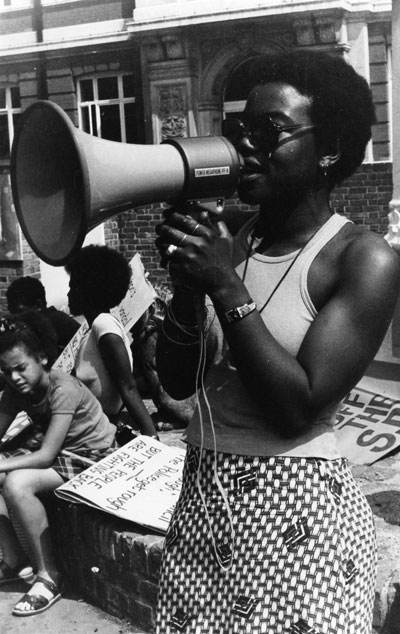To read the full post click on the title above
Olive Morris was an active member of the Brixton Black Panther Movement until the group dissolved and reformed into a number of organisations working on specific aspects within the Black struggle.

Picture: Olive Morris speaking at a rally against police brutality outside Brixton Library (ca. 1972)
The Black Panther and the Black Power Movements in the UK developed from the work of the Universal Coloured Peoples Association. Several American Black Panthers and radical activists visited the UK and gave lectures in London, including Malcom X (1965), Stokely Carmicheal and Angela Davis (both in 1967). Their message struck a chord in second generation Black youth, and gave impulse to the formation of a local Movement.
The British Black Panther Movement, although inspired by the ideology of the US Black Panther Party, was a different type of organisation that responded to the specific reality of Black people in the UK. As an organised movement it was short lived, and its main period of activity was from 1970-1973. Don Lett, a member of the Movement explains the difference in an interview by Greg Whitfield, published by http://www.punk77.co.uk
It all seems so easy now, the very word just rolls off your tongue, “Black British”, but for awhile back there, it wasn’t so simple you know? Fundamentally the Black British and the Black American experience was different, right from source. Black Americans were dragged, screaming and kicking, from the shores of Africa to an utterly hostile America, whilst my parents, they bought a ticket on the ‘The Windrush’ bound for London! So, right off, you have it there, a major fundamental difference. So even though I attended the Black Panther meetings, proudly wearing my Angela Davis badge, read “Soul on Ice”, there was still so much more that we needed to do. It’s true that we became aware, became conscious in many respects and that was partly due to those Panther ideologies, but the total relevance of that movement just didn’t translate into the Black British experience.
The Black Panther Movement in the UK organised itself in groups based around a particular location or area, and each group organised and run their work and activities independently but overseen by a common centre core. This central core – the intelectual leadership of the movement made up of university students – organised the setting up of local groups in areas whith a large Black population, and recruited local working class youth that constituted the local core.
Many members of the Brixton group went on to become inspiring community leaders and became notorious figures in their field of work. The Brixton Panthers had their headquarters at Shakespeare Road in a house that was bought with money donated by John Berger when he won the Bookers Prize.
Here are some of the members of the Brixton Black Panthers:
Althea Jones – medical doctor
Farukh Dhondi – broadcaster and writer
David Udah – church minister
Darcus Howe – broadcaster
Keith Spencer – community activist
Leila Hussain – community activist
Olive Morris – community activist
Liz Turnbull – community activist
Mala Sen – author
Beverly Bryan – academic and writer
Linton Kwesi Johnson – writer and musician
Neil Kenlock – photographer and founder of Choice FM London
This quote from an interview with Linton Kwesi Johnson published in 1998 by Classical Reggae Interviews, describes the work and ethos of the Brixton Black Panthers:
It was an organization that came in to combat racial oppression, to combat police brutality, to combat injustices in the courts against black people, to combat discrimination at the place of work, to combat the mis-education of black youths and black young people.
The Black Panther movement was not a separatist organization like Louis Farrakhan’s ‘Nation Of Islam’. We didn’t believe in anything like that. Our slogan was ‘Black Power – People’s Power’…
…and we also realized that we had to live in the same world as white people and that if we wanted to make some changes we had to win some support from the progressive section of the white population.
We published a newspaper which we would sell on the streets. I used to do that myself. Every Saturday morning I had to go to Brixton Market, Croydon Market, Ballem Market, wherever…(…).
…We would organize campaigns around specific incidents where there was some racial injustice involving the police and so on. We had educational classes for the Youth Section (I was member of the Youth Section) where we studied Black History, Politics and Culture.
And as a matter of fact it was through my involvement with the Black Panther movement I discovered Black Literature read a book called ‘The Souls Of Black Folk’ by W.E.B. Dubois and got inspired to write poetry.
When in time the Black Workers Movement dissolved, its members used the experience they have gained to set up new organisations, such as Black Workers Movement, the Race Today Collective and the Brixton Black Women’s Group. Olive Morris was a founding member of the BWG and OWAAD, and maintained close ties to both organisations throughout her life, even while she was based in Manchester.
If you or someone you know was involved with the Brixton Black Panthers and have stories or pictures of that time that you are willing to share, please use the comments box below to get in touch, in particular if you have any memories of Olive Morris work in the Movement.



Comments